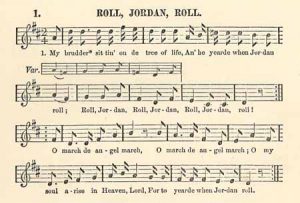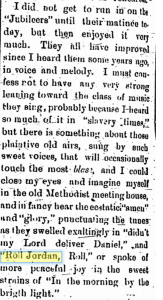After a discussion on the origins of black spirituals I was left questioning the origins of specific spirituals like “Roll Jordan, Roll”. I found, although not very surprising, that “Roll Jordan, Roll” was created by an european man by the name of Charles Wesley in the eighteenth century. He was a methodist preacher and after reading the articles by Jackson and Krehbiel, which have the goal of tackling this question of origin, I was not at all surprised that the origins of the song came from a white, protestant background. What I am left wondering is how “Roll Jordan, Roll” made it’s way to the slave south of the mid to late nineteenth century.
What I have found through my search in pursuit of answering my wonder is that the song may have been used as an effort to christianize the slaves. What I mean is the song wasn’t the sole proprietor in christianizing but was apart of a curriculum in doing so. It seems that the song had gone through an evolution and rather than being a christianizing song to the slaves, it was turned into a song of sorrow or conduit for abolitionism.
The religious allegories of the song had become a story of escaping slavery. There are many adaptations of the song, but the idea of the song being one of being delivered from slavery remains. The photo below is a documentation of one adaptation of the song. It was recorded into the Slave Songs of the United States (1867).
“Roll Jordan, Roll” was eventually widely accepted as a former slave song rather than methodist spiritual. Below is a excerpt from a newspaper article from 1880. Whomever wrote it acknowledges that the songs sung by the Jubilee Singers, included “Roll Jordan, Roll” originated from “slavery times”, not the old English Methodists.
I suppose for me “Roll Jordan, Roll” can not be owned by any race. It is a black spiritual as well as a Methodist hymn.
Works Cited and Consulted:
“The National Capital. Wether–Society–The Jubilee Singers.” Weekly Louisianian (New Orleans), March 20, 1880. Accessed March 20, 2018. African American Newspapers.
“Roll Jordan Roll: A Community in Song and Sound.” The Black Atlantic. March 18, 2014. Accessed March 20, 2018. https://sites.duke.edu/blackatlantic/2014/03/18/roll-jordan-roll-a-community-in-song-and-sound/.
“The River Jordan in Early African American Spirituals by Daniel L. Smith-Christopher.” River Jordan in Early African American Spirituals. Accessed March 20, 2018. http://www.bibleodyssey.org/places/related-articles/river-jordan-in-early-african-american-spirituals.
“Slave Songs of the United South.” William Francis Allen, 1830-1889, Charles Pickard Ware, 1840-1921, and Lucy McKim Garrison, 1842-1877. Slave Songs of the United States. Accessed March 20, 2018. http://docsouth.unc.edu/church/allen/allen.html#slsong1.


